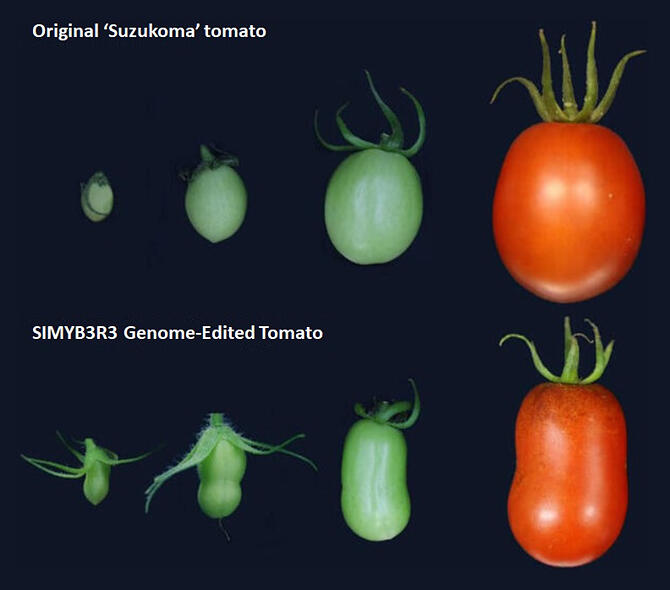A research group led by Associate Professor Katsuhiro Shiratake of the Graduate School of Bioagricultural Sciences, Nagoya University, in collaboration with Professor Masaki Ito of Kanazawa University and Associate Professor Qinglin Zhang of Huazhong Agricultural University in China, has successfully developed a unique peanut-shaped tomato by disrupting the function of the SlMYB3R3 transcription factor gene, which regulates cell division in tomato fruits, using CRISPR/Cas9. The researchers hope that the application of this technology will allow for tomatoes with unique shapes for consumers. The group's research was published in the Journal of Experimental Botany.

Provided by Nagoya University
Tomatoes can have various shapes, such as round, pointy, heart-shaped, elongated like in Italian tomatoes, or pear-shaped. Genes have been identified that alter the shape of fruit by changing the pattern of cell division in the fruit.
The research group focused on the tomato ortholog of MYB3R, a transcription factor found to be involved in the regulation of cell division in Arabidopsis thaliana.
They identified the presence of four MYB3Rs in tomatoes from the genome database and named them SlMYB3R1, SlMYB3R2, SlMYB3R3, and SlMYB3R4. Of these genes, they focused on SlMYB3R3, which they predicted to work to suppress cell division and showed specific gene expression in floral organs, and by editing the genome, created tomatoes with functional disruption of the SlMYB3R3 gene.
Tissue observation of the fruit (cotyledons) in the early stages of development showed that the number of longitudinal cells increased in genome-edited tomatoes, which they felt to be the cause of the formation of elongated fruits. In addition, historical observation of the floral organs revealed deformation of the cotyledons due to the constriction of the corolla. Like the genome-edited tomatoes, histological observations of the floral organs of San Marzano tomatoes, which have longitudinal fruits, also showed deformation of the floral meristem due to constriction of the corolla. In Radana tomatoes, which bear pear-shaped fruits, the researchers found that removing the corolla from the floral organ resulted in pear-shaped fruits that became oval-shaped.
These results indicate that the longitudinal or pear-shaped fruit of tomatoes is caused by the constriction of the fruitlets by the corolla in addition to the direction of cell division in the fruit.
Journal Information
Publication: Journal of Experimental Botany
Title: Genome editing of SlMYB3R3, a cell cycle transcription factor gene of tomato, induces elongated fruit shape
DOI: 10.1093/jxb/erac352
This article has been translated by JST with permission from The Science News Ltd. (https://sci-news.co.jp/). Unauthorized reproduction of the article and photographs is prohibited.




